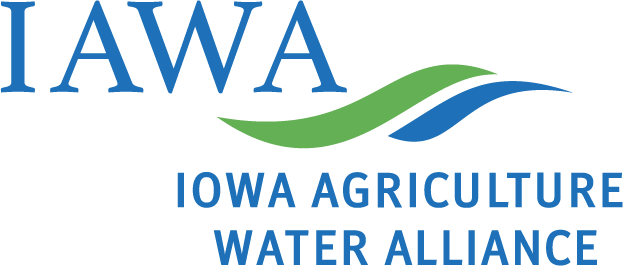Haes Recognized with Circle of Excellence
IAWA Iowa Watershed Award
AMES, IOWA –Miranda Haes, watershed coordinator for the Lower Skunk River Water Quality & Soil Health Initiative, was honored with a Circle of Excellence award from the Iowa Agriculture Water Alliance (IAWA) as part of the fourth annual Iowa Watershed Awards program.
Haes is honored alongside five other watershed coordinators who are also receiving 2021 IAWA Iowa Watershed Awards. The recipients were announced at the 2021 Iowa Water Conference.
“In these challenging times, it’s important to recognize these unsung heroes who continue to make great progress implementing conservation practices that improve water quality,” says Sean McMahon, IAWA Executive Director. “These watershed coordinators have worked during a global pandemic to help meet local community goals while also simultaneously advancing the objectives of the statewide Iowa Nutrient Reduction Strategy.”
Success brings an expanded area for conservation work

This is the second year in a row that Haes has earned this award. In the past year, the area she serves more than doubled with a new Iowa Department of Agriculture and Land Stewardship (IDALS) Water Quality Initiative grant that allows the project to continue for three more years.
“The most exciting thing for me was to submit a grant application again and have it accepted,” Haes says. “It’s a bigger area, with nine watersheds added to the previous five I had.”
When she started the job almost five years ago, she worked with 800 landowners in an area of 135,000 acres. Now her area has 2,000 landowners in an almost 340,000 acre area.
She is based at the Henry County Soil and Water Conservation District office in Mount Pleasant, Iowa, and also works with conservation districts in four other southeast Iowa counties — Des Moines, Jefferson, Lee, and Van Buren.
“Without the support of those offices, this wouldn’t be possible,” she says.
Her project’s main goal is to lower nitrogen, phosphorus, and sediment in streams by helping farmers plant cover crops and install edge-of-field conservation practices. One of those practices is a bioreactor, a buried trench full of wood chips where microbes remove nitrate in water from drainage tile. Another is a saturated buffer, where water from drainage tile is diverted along a stream bank, allowing grasses and soil microbes to capture nutrients before tile water reaches the stream.
At first, Haes discovered signing up farmers for edge-of-field practices was a hard sell. Unlike cover crops, which improve a farm’s soil, the benefits from those practices are less obvious. That’s changing, as Haes has outlet water analyzed by the Iowa Soybean Association and is able to show landowners improvements in water quality.
Last December, when Haes helped organize a bioreactor field day in Lee County, 50 farmers showed up.
“It was a beautiful sunny day,” she recalls. “My goal for the next year is to get even more interest in edge-of-field practices.”
Interest in cover crops is on the rise, too. Last fall farmers applied for nearly 2,000 acres of new cover crop cost share over the year before, bringing the total to 7,500 acres.
“We saw people that had not planted cover crops before,” Haes says.
In the hillier, Southern Iowa Drift Plain that Haes serves, farmers have already installed many terraces, livestock ponds, and sediment control basins as well.
The Covid-19 pandemic brought new challenges for Haes last year. “I had to work from home, so it’s made it a little difficult to do the outreach I normally do,” she says.
In addition to email, social media, and regular mail, Haes says, “I’m finding great value in learning more ways to reach people.” For instance, she is showcasing conservation practices by posting videos of them on YouTube.
She was able to have a few outdoor events and to meet with farmers and landowners in their fields, but other field days were virtual.
Haes is a 2015 University of Iowa graduate with a degree in geography and environmental studies. She cares deeply about the environment, as demonstrated by her living with her husband in a passive solar-heated house that also uses geothermal energy.
Partners in her work include the USDA’s Natural Resources Conservation Service offering technical support and IDALS providing administration support. Iowa Farm Bureau Federation, Iowa Corn and the Iowa Pork Producers Association help with field days. In normal years, her largest yearly meeting is a thank you luncheon organized by Farm Bureau, Iowa Corn and the Lower Skunk River Project.
To help maintain momentum for this work, Haes will receive funding through the IAWA Iowa Watershed Award to apply to the Lower Skunk River Water Quality & Soil Health Initiative as well as funding for her own professional development.
The IAWA Iowa Watershed Awards program was developed by IAWA in partnership with Iowa State University Extension and Outreach, Conservation Districts of Iowa, IDALS, and the Iowa Department of Natural Resources.
The Iowa Agriculture Water Alliance (IAWA) is increasing the pace and scale of farmer-led efforts to improve water quality in Iowa. Founded in 2014 by Iowa Corn, the Iowa Soybean Association, and the Iowa Pork Producers Association, IAWA is building public-private partnerships focused on implementing water quality solutions. Iowa farmers are actively engaged in various conservation efforts that improve water quality. Learn more at www.iowaagwateralliance.com.
